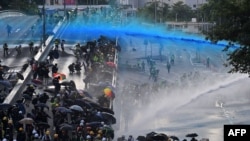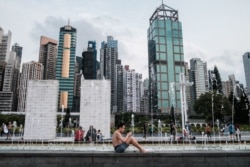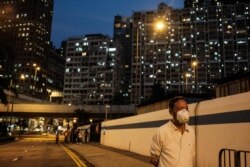Analysts are predicting that China’s recent high-profile posturing over Hong Kong signals a bumpy political future for the semiautonomous city and the likely return of mass protests.
They were reacting to last week’s arrest of 15 prominent democracy activists on charges of illegal assembly, accused of taking part in unapproved protests last year; the declaration by China’s liaison office here that it is not bound by a clause in Hong Kong’s constitution, the Basic Law, barring Beijing from interfering in local affairs; and the liaison office head’s call for Hong Kong to enact national security legislation, shelved since 2003.
Analysts say China’s heightened concern about national security threats, sparked by the coronavirus outbreak and its tense relations with the U.S., has prompted it to push Hong Kong, rocked by months of anti-government protests, to speed enactment of the controversial national security bill after mass protests.
Moreover, they say, Beijing sees the West’s concentration on battling the pandemic as offering a perfect opportunity to act tough on Hong Kong.
“This is a new affront on one country, two systems,” said Kenneth Chan, a political scientist at the Hong Kong Baptist University, referring to the principle for Chinese control of Hong Kong promised under the 1984 Sino-British Joint Declaration.
“The pandemic has provided Beijing a window of opportunity to introduce tough measures over Hong Kong,” he said.
Meanwhile, Steve Tsang, director of University of London’s SOAS China Institute, said Western democracies’ failure to prepare for the COVID-19 outbreak means Chinese President Xi Jinping “is no longer feeling vulnerable because of his earlier mismanagement of the pandemic, and he is not feeling under much pressure from within the establishment.”
Analysts warn that China’s repression in Hong Kong will intensify in the near future, with some believing China is pushing the city to pass the legislation before September’s legislative election. The authorities are nervous that the pro-democracy camp may claim a majority in the same way that it won a landslide victory in district council elections in November, they say.
“If Hong Kong people don’t [behave], that provides an excuse for the party to take harder lines, including canceling the September elections. Xi may well think that Hong Kong is on its own and will have to comply,” Tsang said.
China still relies on Hong Kong for trade and business, but its recent maneuver does not suggest that it was worried about undermining investors' confidence.
“Hong Kong’s capital and technology is not as important for China now as it was [30 years ago], now that it is rich and it is connected to the wider world,” said Zhang Lifan, a Beijing-based independent political commentator.
Hong Kong’s gross domestic product has gone from about one-third the size of China’s in the 1980s to less than 3 percent in 2019, Tsang said.
“COVID-19 has already cost China more than 3 percent of GDP and it has not brought about catastrophe. So, it is not unreasonable that Beijing feels that, if the worst comes to worst in Hong Kong, it would be a price China can pay,” Tsang said.
However, British-based Hong Kong Watch says the Asian financial hub’s value should not be underestimated. As the home to the largest number of initial public offerings by Chinese firms and the largest offshore center for Chinese company bond sales, Hong Kong remains a gateway for Western capital to reach China’s markets, it said in a report.
Chan warned that China’s interventions will hurt Hong Kong’s trade, economic and financial status.
“To the extent that the city is no longer able to retain the confidence of investors, its population and the economy will be quickly de-internationalized, whilst politically and socially Hong Kong is forced to undergo rapid mainlandization,” Chan said.
Wu Qiang, a political scientist formerly with Beijing’s Tsinghua University, said an authoritarian country with national security threats at the top of its priorities, does not always make rational choices, however.
“Beijing’s consistent attitude … is to bolster state security to complete its control of Hong Kong,” he said.
Analysts and activists warn China’s iron-fisted policy toward Hong Kong may ultimately backfire. Many ordinary Hong Kong people are already saying they would take to the streets again if the anti-subversion legislation goes ahead, reviving the anti-government movement which has largely paused amid the coronavirus pandemic.
“The government will not succeed in instilling fear in the public,” said Chan. “The more they harass, bully, humiliate and battle their opponents, the more they turn people against them.”







